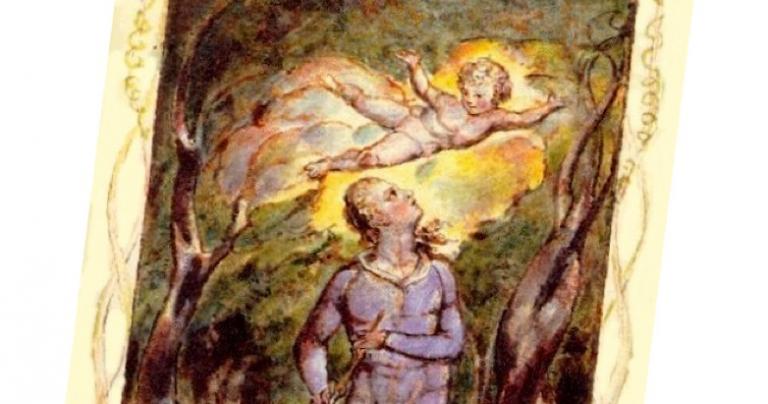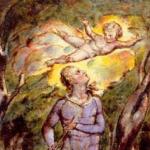 William Blake was, perhaps, more than a bit mad, but he knew beauty. He lived just when the ugliness of the Industrial Revolution was most obvious, but the benefits harder to see. He could see what was going wrong, dark Satanic mills like those of Dante, though he lacked the prophetic vision to see what good might come. Turmoil, revolutionary zeal, were opening up good possibilities for human dignity, but also being used to kill.
William Blake was, perhaps, more than a bit mad, but he knew beauty. He lived just when the ugliness of the Industrial Revolution was most obvious, but the benefits harder to see. He could see what was going wrong, dark Satanic mills like those of Dante, though he lacked the prophetic vision to see what good might come. Turmoil, revolutionary zeal, were opening up good possibilities for human dignity, but also being used to kill.
Heads were rolling and hearts were breaking. A sensitive soul found it all hard to stand and Blake did not endure with sound mind or doctrine.
He loved Jesus so much that Blake was irritated with the Jesus he loved for not existing. The Jesus of reality, God in the flesh, could not be, because Newton. To Blake, this scientist had turned the lovely world into a mechanistic monster, lacking soul and innocence. This would have surprised Newton himself, theist and not-so-orthodox-but-still Christian. Blake, however, saw something Newton did not: his science would be used by materialists to try to disenchant the world.
Yet in the madness, just when you might give up on Blake, comes the beauty of his art and his poetry. He was a plain man on the edge who when he fell into despair, delirium, or delusion could still reach out to God. Nobody should admire Blake, everyone must pity him, but all of us could learn from him.
Beauty, I hope, saved him as innocence, romance, and Jesus kept calling to him. He saw God in nature, in the changing of the seasons, and the faces of children. He despaired in the dirt of London, the tiger nature of industrial man, and the ugliness of colonialism. He was right to hate the evils of his time and love what good he could see.
Blake gives hope, because even imbalanced, in difficult times, unable to understand, beauty broke through so often and balanced him. Newton could not snuff out the stars, nor destroy the beauty of nature, or the mystical tales of Jerusalem. If Blake could not be sure, if the poet Milton was not much of a better guide for him than Newton, poetry and science both failing England, there was still Jesus.
There is something to be said for a person, or at least the idea of a person, so powerful that He haunts the dreams of a man who dreads his non-existence.
Nature, at least, was there, surely for Blake. He could at least at home and in his poetry and art enchant nature again. He did . . . And I am thankful. Unlike Blake, I think Christianity true and that science need not strip the world of divinity. I think mind and ideas are more real than matter and energy, while loving nature. Blake, perhaps, lived when the tensions could not possibly be resolved, at least for him. God bless the beauty he saw.
Here is his poem on Autumn:
O Autumn, laden with fruit, and stained
With the blood of the grape, pass not, but sit
Beneath my shady roof, there thou may’st rest,
And tune thy jolly voice to my fresh pipe;
And all the daughters of the year shall dance!
Sing now the lusty song of fruits and flowers.
‘The narrow bud opens her beauties to
‘The sun, and love runs in her thrilling veins;
‘Blossoms hang round the brows of morning, and 10
‘Flourish down the bright cheek of modest eve,
‘Till clust’ring Summer breaks forth into singing,
‘And feather’d clouds strew flowers round her head.
‘The spirits of the air live on the smells
‘Of frait; and joy, with pinions light, roves round
‘The gardens, or sits singing in the trees.
’ Thus sang the jolly Autumn as he sat,
Then rose, girded himself, and o’er the bleak
Hills fled from our sight; but left his golden load.












